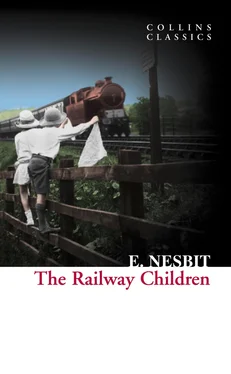‘There’s the house,’ said Mother. ‘I wonder why she’s shut the shutters.’
‘Who’s she ?’ asked Roberta.
‘The woman I engaged to clean the place, and put the furniture straight and get supper.’
There was a low wall, and trees inside.
‘That’s the garden,’ said Mother.
‘It looks more like a dripping-pan full of black cabbages,’ said Peter.
The cart went on along by the garden wall, and round to the back of the house, and here it clattered into a cobble-stoned yard and stopped at the back door.
There was no light in any of the windows.
Everyone hammered at the door, but no one came.
The man who drove the cart said he expected Mrs Viney had gone home.
‘You see your train was that late,’ said he.
‘But she’s got the key,’ said Mother. ‘What are we to do?’
‘Oh, she’ll have left that under the doorstep,’ said the cart man; ‘folks do hereabouts.’ He took the lantern off his cart and stooped.
‘Ay, here it is, right enough,’ he said.
He unlocked the door and went in and set his lantern on the table.
‘Got e’er a candle?’ said he.
‘I don’t know where anything is.’ Mother spoke rather less cheerfully than usual.
He struck a match. There was a candle on the table, and he lighted it. By its thin little glimmer the children saw a large bare kitchen with a stone floor. There were no curtains, no hearth-rug. The kitchen table from home stood in the middle of the room. The chairs were in one corner, and the pots, pans, brooms, and crockery in another. There was no fire, and the black grate showed cold, dead ashes.
As the cart man turned to go out after he had brought in the boxes, there was a rustling, scampering sound that seemed to come from inside the walls of the house.
‘Oh, what’s that?’ cried the girls.
‘It’s only the rats,’ said the cart man. And he went away and shut the door, and the sudden draught of it blew out the candle.
‘Oh, dear,’ said Phyllis, ‘I wish we hadn’t come!’ and she knocked a chair over.
‘ Only the rats!’ said Peter, in the dark.
Peter’s Coal-Mine
‘What fun!’ said Mother, in the dark, feeling for the matches on the table. ‘How frightened the poor mice were – I don’t believe they were rats at all.’
She struck a match and relighted the candle and everyone looked at each other by its winky, blinky light.
‘Well,’ she said, ‘you’ve often wanted something to happen and now it has. This is quite an adventure, isn’t it? I told Mrs Viney to get us some bread and butter and meat and things, and to have supper ready. I suppose she’s laid it in the dining-room. So let’s go and see.’
The dining-room opened out of the kitchen. It looked much darker than the kitchen when they went in with the one candle. Because the kitchen was whitewashed, but the dining-room was dark wood from floor to ceiling, and across the ceiling there were heavy black beams. There was a muddle maze of dusty furniture – the breakfast-room furniture from the old home where they had lived all their lives. It seemed a very long time ago, and a very long way off.
There was a table certainly, and there were chairs, but there was no supper.
‘Let’s look in the other rooms,’ said Mother; and they looked. And in each room was the same kind of blundering half-arrangement of furniture, and fire-irons and crockery, and all sorts of odd things on the floor, but there was nothing to eat; even in the pantry there were only a rusty cake-tin and a broken plate with whitening mixed in it.
‘What a horrid old woman!’ said Mother; ‘she’s just walked off with the money and not got us anything to eat at all.’
‘Then shan’t we have any supper at all?’ asked Phyllis, dismayed, stepping back on to a soap-dish that cracked responsively.
‘Oh, yes,’ said Mother, ‘only it’ll mean unpacking one of those big cases that we put in the cellar. Phil, do mind where you’re walking to, there’s a dear. Peter, hold the light.’
The cellar door opened out of the kitchen. There were five wooden steps leading down. It wasn’t a proper cellar at all, the children thought, because its ceiling went up as high as the kitchen’s. A bacon-rack hung under its ceiling. There was wood in it, and coal. Also the big cases.
Peter held the candle, all on one side, while Mother tried to open the great packing-case. It was very securely nailed down.
‘Where’s the hammer?’ asked Peter.
‘That’s just it,’ said Mother. ‘I’m afraid it’s inside the box. But there’s a coal-shovel – and there’s the kitchen poker.’
And with these she tried to get the case open.
‘Let me do it,’ said Peter, thinking he could do it better himself. Everyone thinks this when he sees another person stirring a fire, or opening a box, or untying a knot in a bit of string.
‘You’ll hurt your hands, Mammy,’ said Roberta; ‘let me.’
‘I wish Father was here,’ said Phyllis; ‘he’d get it open in two shakes. What are you kicking me for, Bobbie?’
‘I wasn’t,’ said Roberta.
Just then the first of the long nails in the packing-case began to come out with a scrunch. Then a lath was raised and then another, till all four stood up with long nails in them shining fiercely like iron teeth in the candle-light.
‘Hooray!’ said Mother; ‘here are some candles – the very first thing! You girls go and light them. You’ll find some saucers and things. Just drop a little candle-grease in the saucer and stick the candle upright in it.’
‘How many shall we light?’
‘As many as ever you like,’ said Mother, gaily. ‘The great thing is to be cheerful. Nobody can be cheerful in the dark except owls and dormice.’
So the girls lighted candles. The head of the first match flew off and stuck to Phyllis’s finger; but, as Roberta said, it was only a little burn, and she might have had to be a Roman martyr and be burned whole if she had happened to live in the days when those things were fashionable.
Then, when the dining-room was lighted by fourteen candles, Roberta fetched coal and wood and lighted a fire.
‘It’s very cold for May,’ she said, feeling what a grown-up thing it was to say.
The fire-light and the candle-light made the dining-room look very different, for now you could see that the dark walls were of wood, carved here and there into little wreaths and loops.
The girls hastily ‘tidied’ the room, which meant putting the chairs against the wall, and piling all the odds and ends into a corner and partly hiding them with the big leather arm-chair that Father used to sit in after dinner.
‘Bravo!’ cried Mother, coming in with a tray full of things. ‘This is something like! I’ll just get a tablecloth and then –’
The tablecloth was in a box with a proper lock that was opened with a key and not with a shovel, and when the cloth was spread on the table, a real feast was laid out on it.
Everyone was very, very tired, but everyone cheered up at the sight of the funny and delightful supper. There were biscuits, the Marie and the plain kind, sardines, preserved ginger, cooking raisins, and candied peel and marmalade.
‘What a good thing Aunt Emma packed up all the odds and ends out of the store cupboard,’ said Mother. ‘Now, Phil, don’t put the marmalade spoon in among the sardines.’
‘No, I won’t, Mother,’ said Phyllis, and put it down among the Marie biscuits.
‘Let’s drink Aunt Emma’s health,’ said Roberta, suddenly; ‘what would we have done if she hadn’t packed up these things? Here’s to Aunt Emma!’
And the toast was drunk in ginger wine and water, out of willow-patterned tea-cups, because the glasses couldn’t be found.
Читать дальше












